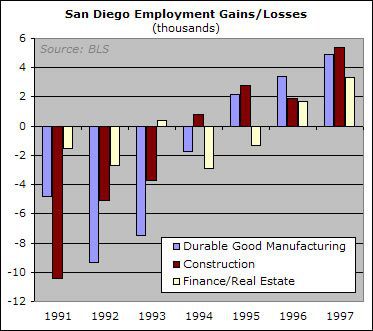OK, indulge me for one more 1990s housing bust fun fact and then we can return our focus to more contemporary concerns.
As we’ve discussed, everyone holds job losses responsible for the downturn. But not just any old job losses — the blame is laid specifically at the feet of the defense and aerospace industries, which suffered as the Cold War wound down in the early 90s. And thus is born one of the bullish analytical classics: the "diverse economy" argument. Since defense and aerospace comprise a much smaller proportion of San Diego’s economy in 2006 than they did in 1990, we are immune to job losses and a resultant housing downturn.


Correct – other sectors were
Correct – other sectors were hit as well. But these are not independent events. Well-paid cold war engineers spent lots of money and created many jobs through multiplier effects. So some of these losses are the result of defense layoffs. I’m not questioning the bubble premise, I’m just suggesting we not make too much of non-independent job loss data.
Nice chart, but it isn’t
Nice chart, but it isn’t useful. Your first data point is after the corner was turned.
The key statement in your article is “However, this should suffice because overall employment peaked in late 1990 and didn’t start to decline until 1991.”
If unemployment peaked in 1990, that means the combination of job growth and job losses in the late 1980s led up to the peak in 1990/91 of the job market.
You’re on the right track, however to make our case that unemployment didn’t do it and exhaustion did it, we’d need data ranging over the period from 1985 to 1990 or so.
The chart is useful however to show that the RE/Mortgage industry in an of itself can be the boat anchor dragging RE down once the speculative corner is turned.
The chart is useful however
The chart is useful however to show that the RE/Mortgage industry in an of itself can be the boat anchor dragging RE down once the speculative corner is turned.
I think that was the entire point of the article… I don’t understand what you are trying to say with the rest of your comment.
His point was that the
His point was that the bull’s claim that Defense/Aerospace job loss precipitated the downturn is hot air, isn’t supported by the data he used.
1. Unemployment peaked before the downturn started. It’s unknown if the Defense/Aerospace losses in ’89/’90 caused the peak to break.
2. Job losses in the industry the bull’s claim is significant in ’92,’93. Which potentially fueled the downturn.
3. Similarly, the RE losses in 1991 where significant likely due to the slow down and pullback in 1990. Those losses may be contributing to the decline.
I think the point was that
I think the point was that the bull’s make it seem like only defense industry jobs were lost, and that everything else did fine. (aka the “diverse economy” argument). This article isn’t really talking about what precipitated what. I think you are confusing the point of this article with the points of prior articles.
Significant aerospace
Significant aerospace unemployment did not occur until around 1992, years after the START of the housing decline in 1989. See the UAW’s website at http://www.uaw.org/publications/jobs_pay/01/0901/jpe08.html
I totally agree with Rich that aerospace layoffs in the 1990s did not CAUSE the downturn in the housing market. Sure, they didn’t help things, but they sure didn’t cause them either.